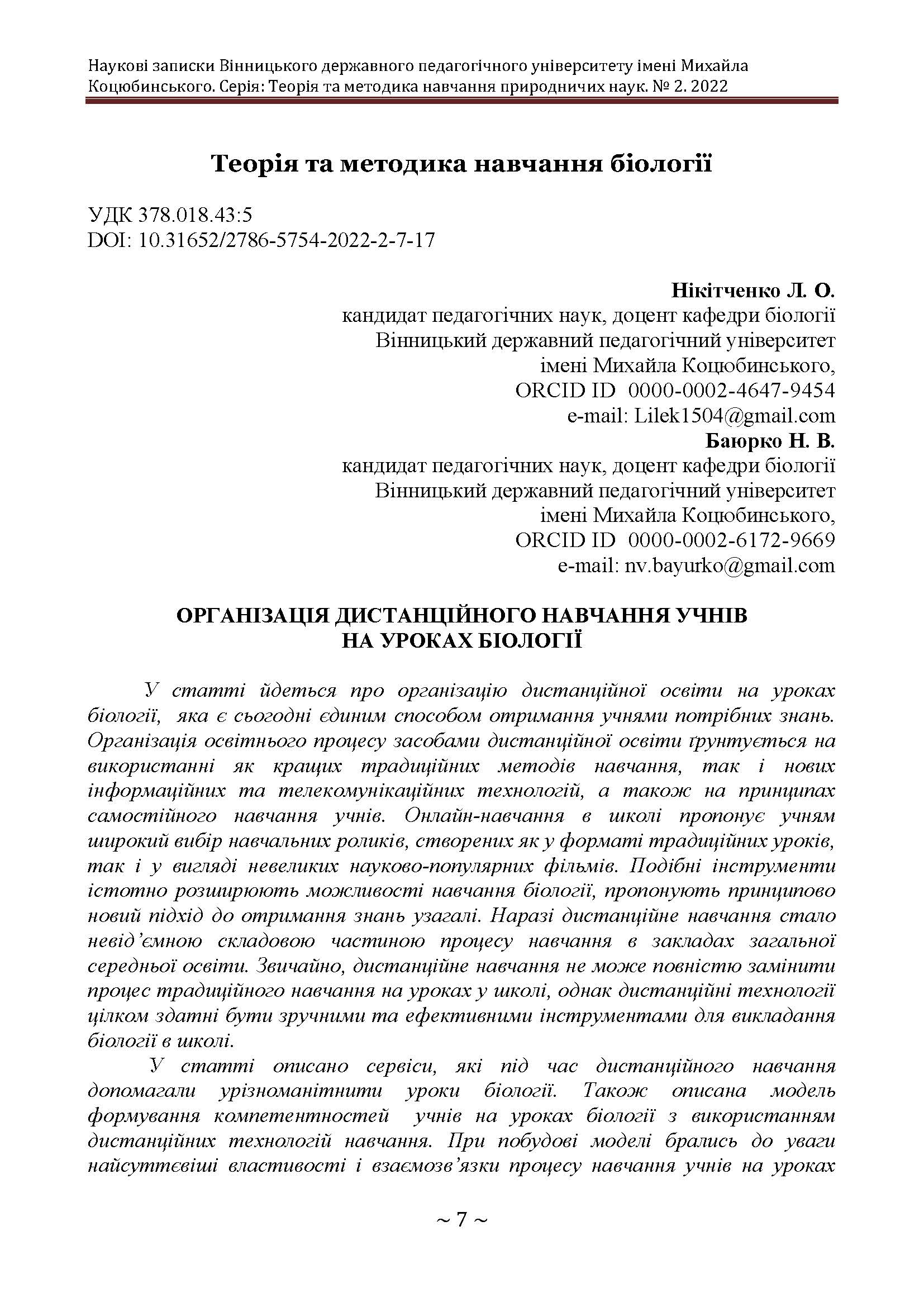Abstract
The article deals with the organization of distance education in biology classes, which is today the only way for students to obtain the necessary knowledge. The organization of the educational process by means of distance education is based on the use of both the best traditional teaching methods and new information and telecommunication technologies, as well as on the principles of independent learning of students. Online learning at school offers students a wide selection of educational
videos, created both in the format of traditional lessons and in the form of small popular science films. Such tools significantly expand the possibilities of teaching biology, offer a fundamentally new approach to acquiring knowledge in general. To
date, distance learning has become an integral part of the learning process in institutions of general secondary education. Of course, distance learning cannot completely replace the process of traditional learning in school classes, but distance
technologies are quite capable of playing the role of convenient and effective tools for teaching biology at school.
The article describes the services that helped diversify biology lessons during distance learning. The model of students' competence formation in biology lessons using distance learning technologies is also described. When building the model, the
most essential properties and interrelationships of the learning process of students in biology classes in institutions of general secondary education with the help of distance learning technologies were taken into account. We constructed a model for
training schoolchildren using distance learning technologies based on the following components: purpose, principles, content blocks, practical blocks, components of readiness and their corresponding criterion indicators, levels of students' competence
development, and the result. the proposed model is based on the idea of a comprehensive approach to the process of teaching students in biology classes in remote mode and is implemented through a rational combination of the existing
pedagogical experience of the teacher with innovative and information technologies, which are aimed at mastering the competencies of students in the process of educational activities in institutions of general secondary education.
References
Андрущенко В.П. Засоби дистанційного електронного навчання і педагогічні технології. Вісник академії дистанційної освіти. 2004. № 2. С. 2-5.
Биков В.Ю., Кухаренко В.М., Сиротенко Н.Г., Рибалко О.В., Богачков Ю.М. Технологія розробки дистанційного курсу: навчальний посібник / За ред. В.Ю. Бикова, В.М. Кухаренка. Київ: Міленіум, 2008. 324 с.
Думанський Н.О. Класи сучасних технологій дистанційної освіти. Вісник Національного університету «Львівська політехніка». 2008. № 26 (610). С. 119-125.
Коберник І. Організація дистанційного навчання в школі. Методичні рекомендації. URL: https://mon.gov.ua/storage/app/media/zagalna%20serednya/metodichni%20recomendazii/2020/metodichni%20recomendazii-dustanciyna%20osvita2020.pdf
Ляховська К.В., Довгалюк А.С., Нікітченко Л.О. Сучасний урок біології в сучасних класах. Materialy XV Mezinarodni vedecko-prakticka konference «dny vedy – 2019», Volume 9: Pedagogika vedy. Praha : Publishing House «Education and Science», 2019. p. 8-11.
Морзе Н.В. Критерії якості електронних навчальних курсів, розроблених на базі платформ дистанційного навчання. Інформаційні технології в освіті. 2009. № 4. С. 63-75
Нікітченко Л.О., Горобець А.В., Опушко Н.Р., Левчук Н.В. Упровадження засобів дистанційного навчання в процесі вивчення природничих дисциплін. Сучасні інформаційні технології та інноваційні методи навчання в підготовці фахівців: методологія,теорія, досвід, проблеми. 2020. Вип. 57. С. 48-54.
Про затвердження Концепції розвитку дистанційної освіти в Україні : Постанова МОН України від 20 груд. 2000 р. URL: http://www.osvita.org.ua/distance/pravo/00.html
Про затвердження Положення про дистанційне навчання : Наказ Міністерства освіти і науки України від 25. 04. 2013 р. № 466. URL: https://zakon.rada.gov.ua/laws/show/z0703-13#Text

This work is licensed under a Creative Commons Attribution 4.0 International License.
Copyright (c) 2022 Лілія Нікітченко, Наталія Баюрко

